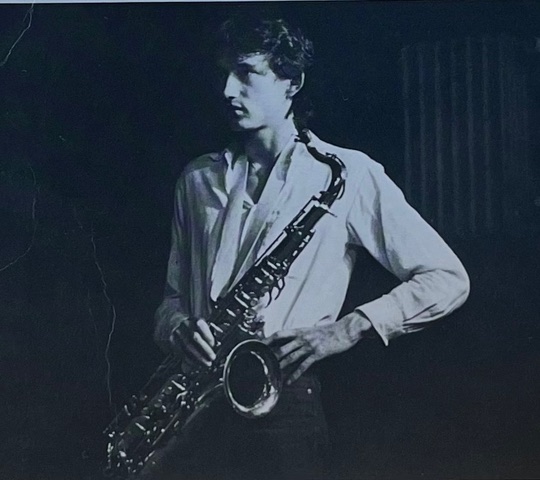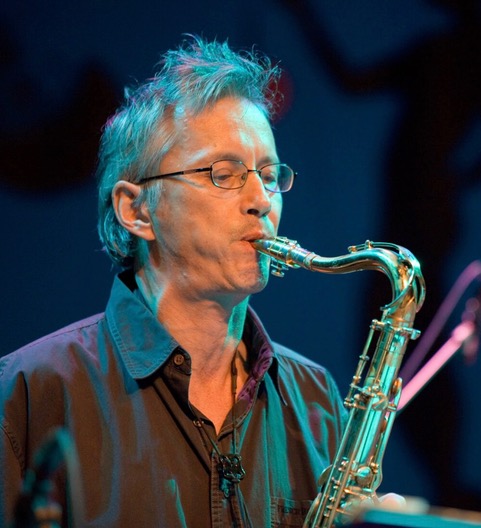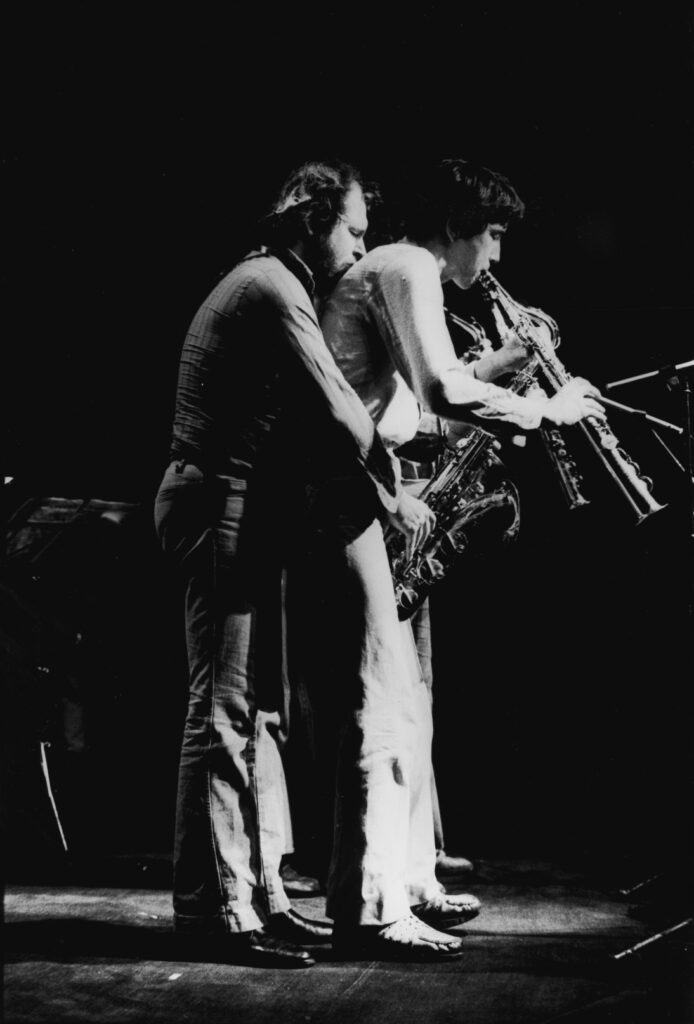 1979 foto: Anko C. Wieringa
1979 foto: Anko C. Wieringa
 foto Tom Beetz.
foto Tom Beetz.
In memoriam Maarten van Norden
Eind jaren tachtig kreeg ik een opdracht om een compositie te schrijven voor Orkest de Volharding. Dat was in de bloeitijd van de Nederlandse ensemblecultuur waarin ieder ensemble een heel eigen signatuur en opvatting had, zeker de Volharding. Bij die club moest je stevig in je schoenen staan en een goed verhaal hebben. Daar leerde ik Maarten van Norden kennen die toen een van de jongste ensemble musici was en deel uitmaakte van de no nonsense scheurende saxgroep van de Volharding. Maarten was direct geïnteresseerd en behulpzaam in het verbeteren van mijn partijen voor de saxen en heel open en vriendelijk in het contact. In die tijd besloot hij ook om compositie te gaan studeren bij Louis Andriessen aan het Koninklijk Conservatorium in Den Haag samen met o.a. Calliope Tsoupaki, Sinta Wullur, Micha Hamel en ondergetekende.
De treinreizen met elkaar naar Den Haag waren onvergetelijk. Maarten sprak net iets trager dan de meeste anderen, een beetje vaderlijk, altijd licht ironisch en vaak met een glimlach waardoor hij in ieder geval op mij een wijze en rustige indruk maakte. Dat dat rustige ten dele schijn was bleek uit zijn totaal opgewonden en ruige fysieke soli op zijn tenor bij dat andere orkest waar hij zo ontzettend veel leerde, het Willem Breuker Kollektief waarmee hij jaren de wereld rondtoerde. Na de gecomponeerde muziek bij de Volharding en het ongelimiteerd improviseren bij Breuker (en tevens bij Willem van Manen’s Contraband) ontwikkelde Maarten een eigen muzikale taal waarmee hij zich door zijn liefde voor Funk duidelijk onderscheidde van de esthetiek van zijn leermeesters. Hij richtte de band Future Shock op, een jazz-rock formatie waarin hij tot bloei kwam als tenorist en ongegeneerd keiharde swingende grooves componeerde maar wel vanuit het denkraam van wat hij leerde als klassiek componist. Future Shock maakte verschillende cd’s en had veel succes. Daarna speelde hij met veel plezier weer een tijd bij Willem Breuker.
Hoewel hij zich al een beetje aan de oude kant vond toen hij zich inschreef voor het conservatorium in Den Haag, is hij lang blijven studeren. Na Den Haag ging hij naar de prestigieuze Yale University en studeerde hij bij Jacob Druckman en Allen Forte. Vooral de theorievorming van Forte beïnvloedde Maarten sterk. Als een alchemist zocht hij naar de juiste formule voor de mooiste noten en juist de combinatie van het omarmen van het academische maar tegelijkertijd ook het improvisatoire en handelen vanuit impuls maakt zijn werk heel eigen.
Zijn studie Contemporary Music through non Western techniques aan het Amsterdams Conservatorium benadrukt Maarten’s open blik en zijn interesse in de veelzijdigheid van muzikale talen en het vermogen om verschillende invloeden samen te brengen. Zijn werk werd met veel succes uitgevoerd door Nederlandse en internationale top ensembles en was te horen op vele grote podia. Maarten had een groot sociaal hart en nam zijn verantwoordelijkheid voor het muziekleven via talrijke bestuursfuncties waaronder die binnen het bestuur van het Nieuw Geneco.
Als componist een vrije geest en een authentieke cross-over componist avant la lettre. Als mens collegiaal, charmant, geestig en warm.
Martijn Padding
 1980 Willem Breuker en Maarten.
1980 Willem Breuker en Maarten.
foto: Paul van Damme
In memoriam Maarten van Norden
In the late 1980s, I was commissioned to write a composition for Orkest de Volharding. This was in the heyday of the Dutch ensemble culture, in which every ensemble had its own, clear-cut signature and ideas, and this held certainly true for De Volharding. It was an outfit that required firm beliefs and a good story on one’s own part. That’s where I got to know Maarten van Norden, who was one of the youngest ensemble musicians, and part of De Volharding’s no nonsense powerhouse sax section. Maarten was immediately interested and helpful in improving my parts for the saxes, and he was very open and friendly in our contacts. In this period, he also decided to study composition with Louis Andriessen at the Royal Conservatory in The Hague, where Calliope Tsoupaki, Sinta Wullur, Micha Hamel and yours truly were among his fellow students.
The train journeys we took to The Hague were unforgettable. Maarten spoke just a little bit more slowly than most people, a bit fatherly, always mildly ironic and often with a smile, which gave me the impression of a wise and calm man. That this calmness was only in appearance showed from his over-excited, rough and physical solos on tenor sax with that other orchestra where he learned so much, the Willem Breuker Kollektief, with which he toured the world. In addition to the written music with De Volharding, the boundless improvisations with the Breuker band (and also in Willem van Manen’s Contraband), Maarten developed his own musical language, in which his love for funk distinguished him clearly from the aesthetics of his masters. He started the band Future Shock, a jazz-rock outfit where he flourished as a tenorist and composed ferociously hard swinging grooves, but always based on the trade he had learned as a classical composer. Future Shock released several CDs and was a great success. After this, he was happy to rejoin Willem Breuker for a while.
Although he felt himself to be rather old when he signed up at the The Hague conservatory, he kept on studying for quite a long time. After his studies in The Hague, he went to the prestigious Yale University, and studied with Jacob Druckman and Allen Forte. Especially Forte’s development of theory was a major influence on Maarten. Like an alchemist, he kept looking for the right formula for the greatest notes, and especially the combination of embracing academic notions as well as improvisation, and acting on impulse, made his work very idiosyncratic.
His study of Contemporary Music through non-Western Techniques at the Amsterdam Conservatory stresses Maarten’s open view and his interest in the versatility of musical languages and his ability to combine a variety of influences. His work was successfully performed by the very best Dutch and international ensembles for audiences in many great concert halls. Maarten had a huge social heart and took responsibility for the Dutch music life in various positions on the boards of interest groups, such as the Nieuw Geneco, the Dutch association of composers.
As a composer he was a free spirit and an authentic cross-over composer avant la lettre. As a person he was amicable, charming, witty and warm.
Martijn Padding
